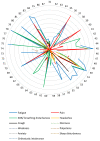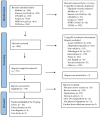Most Common Long COVID Physical Symptoms in Working Age Adults Who Experienced Mild COVID-19 Infection: A Scoping Review
- PMID: 36554098
- PMCID: PMC9778298
- DOI: 10.3390/healthcare10122577
Most Common Long COVID Physical Symptoms in Working Age Adults Who Experienced Mild COVID-19 Infection: A Scoping Review
Abstract
Background: One-third of patients who recover from COVID-19 present with long COVID. Their symptoms are broad, affecting their physical functioning and, ultimately, their quality of life. Many of those individuals who develop long COVID, possibly from a mild COVID-19 infection, are in the 18-65 age group. This prolongation of malaise directly influences national workforce economies.
Objectives: To summarise the commonly reported physical symptoms of long COVID in order to inform potential adjustments in healthcare for the employable population.
Methods: The Embase, CINAHL, Medline, SCOPUS, and WHO COVID-19 databases were searched. The study selection process was based on the PRISMA guidelines. The extracted data were synthesised and presented narratively.
Results: 7403 studies were accessed, comprising 60 cohort studies and 10 case series/studies, representing 289,213 patients who met our criteria. The most frequently reported physical symptoms were fatigue (92%), shortness of breath (SOB) (81.8%), muscle pain (43.6%), and joint pain (34.5%).
Conclusions: The range of reported physical symptoms was broad and varied; the main ones being fatigue, breathlessness/SOB, and pain. Similarities observed between long COVID and other post-acute infection syndromes may help formulate protocols to manage and promote recovery for long COVID patients. Inconsistencies were evident, particularly with a lack of adherence to the standardised definitions of long COVID.
Keywords: adults; long COVID; mild COVID-19; physical symptoms.
Conflict of interest statement
The authors declare no conflict of interest.
Figures



References
-
- World Health Organization (WHO) Coronavirus COVID-19 Dashboard. [(accessed on 8 December 2021)]. Available online: https://covid19.who.int.
-
- Aouissi H.A., Kechebar M.S.A., Ababsa M., Roufayel R., Neji B., Petrisor A.-I., Hamimes A., Epelboin L., Ohmagari N. The Importance of Behavioral and Native Factors on COVID-19 Infection and Severity: Insights from a Preliminary Cross-Sectional Study. Healthcare. 2022;10:1341. doi: 10.3390/healthcare10071341. - DOI - PMC - PubMed
Publication types
LinkOut - more resources
Full Text Sources
Miscellaneous

